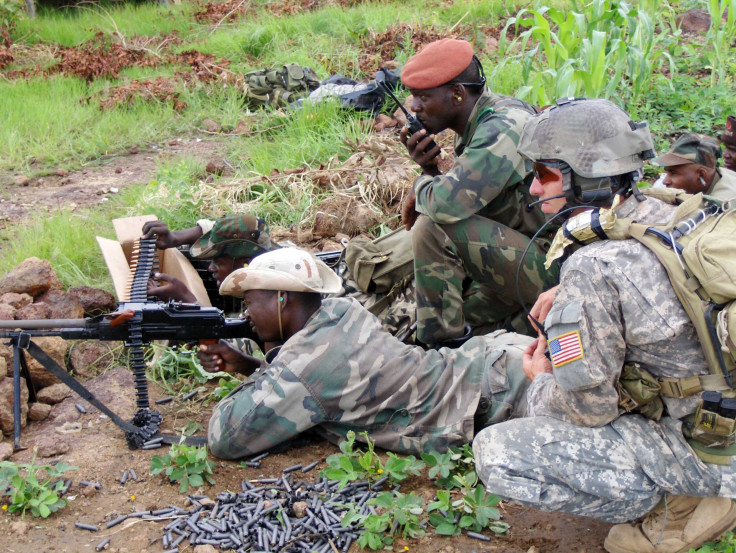France Suddenly Intervenes In Mali, Turning Domestic Insurgency Into Global Conflict

France has abruptly stepped into the fray in the West African country of Mali, where an Islamist insurgency linked to al-Qaeda has shown unprecedented strength in recent days.
On Friday, French President Francois Hollande made a significant but vague statement indicating that French military participation in Mali was a real possibility.
“France will do this strictly within the framework of the resolutions of the United Nations Security Council,” said Hollande at a press conference, suggesting that French troops would be deployed alongside African soldiers to fight the insurgency in several months’ time.
He neglected to mention that French forces were already on the ground in Mali.
Around the time that announcement was made, witnesses in Mali reported sightings of French troops in the country. A reporter from the French newspaper Le Monde noted C-160 aircraft -- a plane primarily used by France, though it is also employed by Germany and Turkey -- arriving at Sevare, with "light-skinned men" on board. The Sevare airport serves Mopti, a town that straddles the line between Mali’s north and south.
Le Monde also got confirmation of the European soldiers’ presence from a Malian official, as well as an assurance from a French diplomat in New York City: “We are there, without a doubt.”
It became official later on Friday, when Hollande admitted that French troops were indeed already on Malian soil.
“I have agreed to Mali's demand, which means French forces have provided support to Mali this afternoon,” Hollande said. “The operation will last as long as is necessary." French Foreign Minister Laurent Fabius said the troops had already launched airstrikes.
The move is significant because it seems to forego the careful planning process that has already been initiated by the international community.
“There hasn’t been a clear international consensus yet; there hasn’t been enough time to do that under the auspices of the UN,” says Jacob Zenn, an Africa analyst with the Washington-based Jamestown Foundation.
“[France’s arrival] would be the first engagement of foreign troops with the Islamist militants in Mali, and that would definitely add an international element to the conflict. Once people start seeing these Islamists fighting with Western forces, it could easily turn into a struggle that a whole lot of militants will want to join.”
The risks of French intervention are apparent -- but so too are the risks of waiting for a UN-sanctioned intervention, which could take several months to go into effect.
Mali’s northern area, which is roughly the size of France, has been overtaken by insurgents who benefited from a proliferation of weapons arising from the Libyan revolution of 2011. (Libya's doomed Moammar Gadhafi had employed -- and armed -- many regional mercenaries to fight against the uprising.)
An invasion by Tuaregs -- stateless nomads hailing from the Sahel, a band of semi-arid land just south of the Sahara desert -- destabilized northern Mali in January of 2012, allowing the region to be overtaken again by Islamist extremists in the spring. These occupiers have implemented a harsh version of Shariah, or Islamic law, across northern Mali and established training camps for insurgents. The area has become a haven for militants linked to al-Qaeda in the Islamic Maghreb, or AQIM, turning this domestic crisis into a global security issue.
The insurgency was helped by a concurrent coup in Bamako, Mali’s capital city. Mutinous soldiers overthrew the civilian government last March, and the national government -- which had operated as a stable democracy for two decades -- has been in turmoil ever since.
African troops from nearby countries have agreed to intervene in Mali, since Bamako’s own army has so far proven incapable of ousting the insurgency. A plan from the Economic Community of West African States, or ECOWAS, was approved by the UN Security Council on Dec. 20; it authorized a force of 3,000 African troops to intervene in Mali sometime this year.
“The Security Council decides to authorize the deployment of an African-led International Support Mission in Mali (AFISMA) for an initial period of one year,” said the resolution, which went on to emphasize the need for further preparations, constant progress reports and evidence of operational readiness. It was a careful plan, and for good reason.
“There are lots of risks,” says Zenn. “There are a lot of coordination issues to work through, and it is very important that this be a locally driven operation with the participation of Malians themselves. If the African troops launched too quickly and got routed, it would exacerbate the problem in many ways.”
But the situation in Mali became more urgent on Wednesday, as insurgents affiliated with AQIM rolled south and into the town of Konna, which is just 45 miles north of Mopti. On Friday, the residents of Sevare began to flee in anticipation of the rebels’ further advancement.
A seizure of Mopti would be bad news for Bamako, which is still hundreds of miles away from the insurgents but lacks the military strength to deter them should they continue southward. Between Mopti and Bamako is the town of Segou, where German newspaper Der Spiegel reports that elite French troops are already training Malian forces.
The sudden arrival of more forces into Sevare shows that France is taking this insurgency very seriously, which has major implications not only for Mali, but for the entire international community. If French troops can help regional forces quash this rebellion, order may be preserved -- at least until ECOWAS soldiers can launch their own offensive.
But if France’s bold move proves too brash, the early intervention could backfire, allowing the conflict to escalate and take on global new dimensions.
© Copyright IBTimes 2024. All rights reserved.












